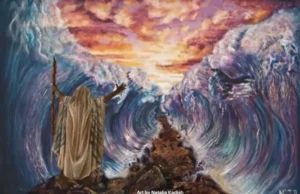Comparing Parnasah and the Splitting of the Red Sea
The Gemara (Pesachim 118a) draws a comparison between earning a livelihood and the splitting of the Red Sea. What is the connection between the two? In fact, what was difficult for God when He parted the Sea?
Nachshon Ben Aminadav’s Leap of Faith
R’ Chaim Shmuelevitz asks why only Nachshon ben Aminadav had the courage to jump into the sea, while the rest of the Israelites hesitated. He explains that while others might have been willing to sacrifice their lives, it was Nachshon’s faith in God’s promise of salvation that moved him to act. His leap represented a pure and unwavering trust in God.
The Curse of Toil: Adam’s Punishment
After Adam’s sin in Gan Eden, he was cursed to earn his bread “by the sweat of his brow.” This curse signifies not only physical labor but emotional hardship, as it leads to a false sense of self-reliance. The term “be’itzavon” implies that the pursuit of sustenance will involve worry, as it will be difficult to recognize that our livelihood ultimately comes from Hashem.
Parnasah: A Struggle to Acknowledge Divine Providence
While both health and wealth require human effort and Divine grace, people often find it easier to acknowledge God’s role in their health than in their wealth. The struggle of parnasah is particularly challenging because, unlike health, it is harder to see God’s direct involvement in our financial success.
The Gemara suggests that Hashem typically does not perform miracles in the realm of parnasah because the purpose of this challenge is for man to struggle and place his trust in God. This difficulty in recognizing Divine intervention in one’s livelihood reflects Adam’s expulsion from Gan Eden, where God’s presence was once tangible and direct.
The Role of Faith in the Struggle
The difficulty of splitting the sea was not for God, but for man. Nachshon ben Aminadav heroically trusted in God’s promise of salvation and took the leap into the sea. Similarly, within the realm of parnasah, we must overcome the worry and doubt surrounding our livelihood and trust that, despite the struggle, God is ultimately supporting us.

